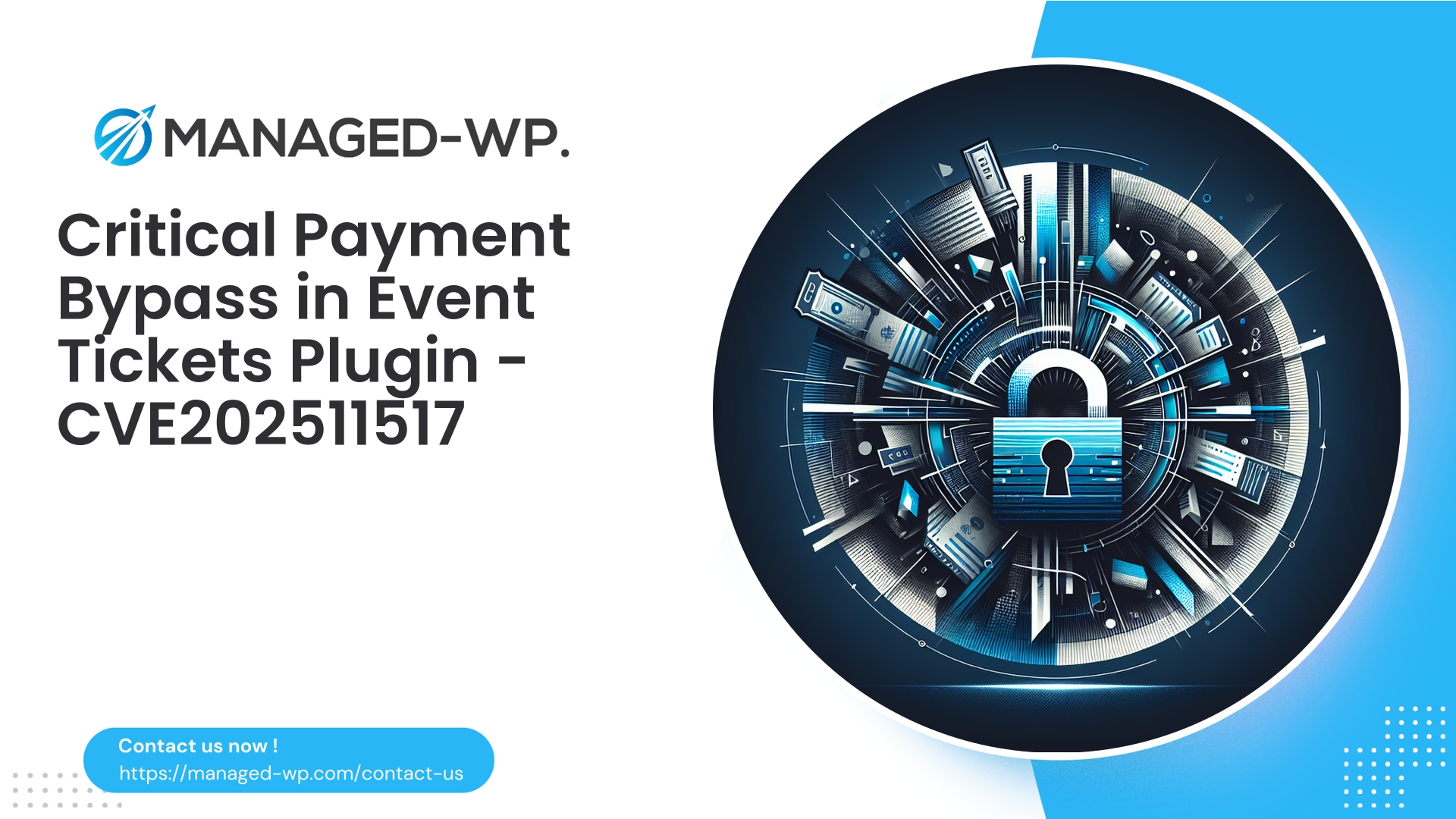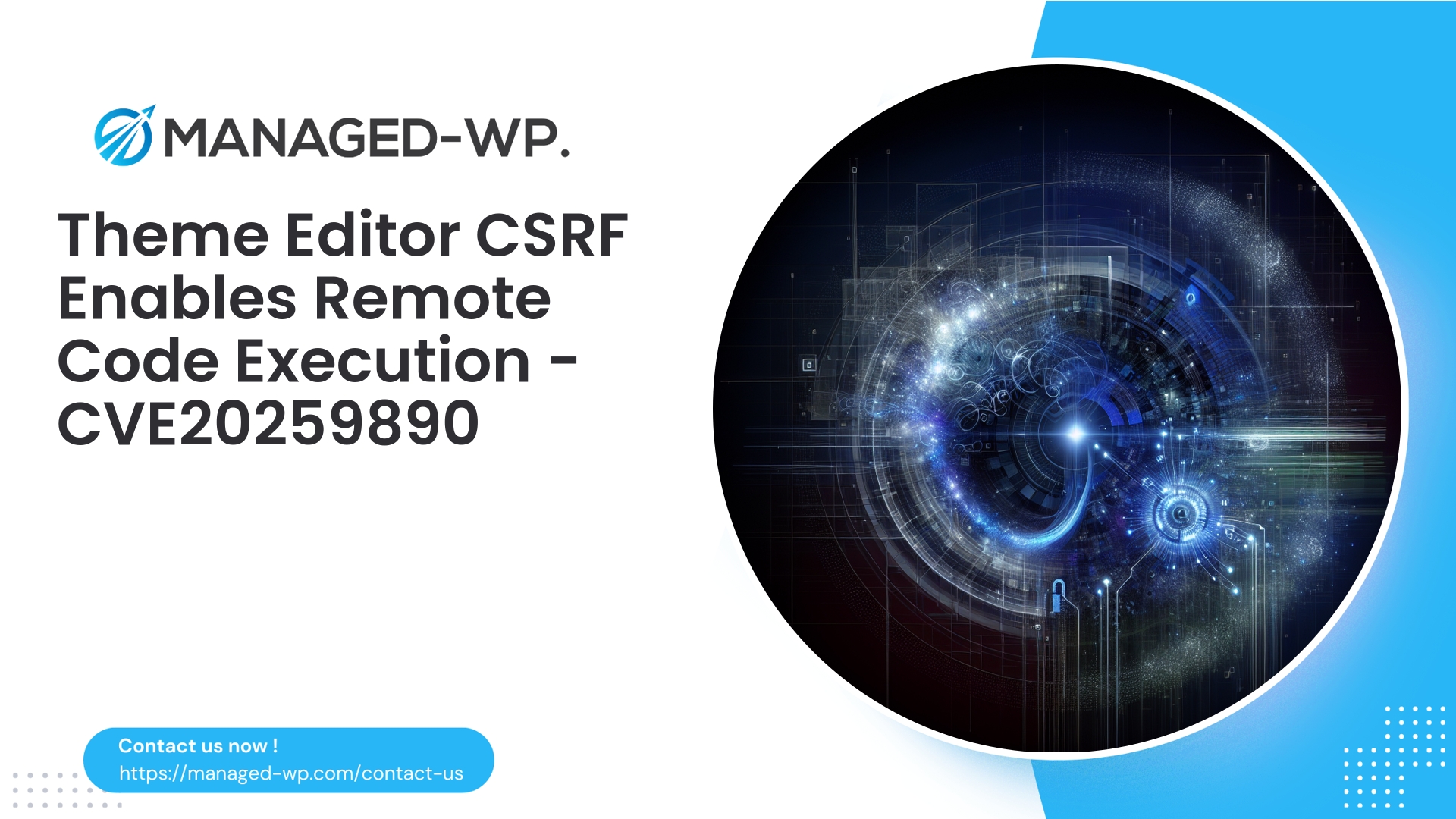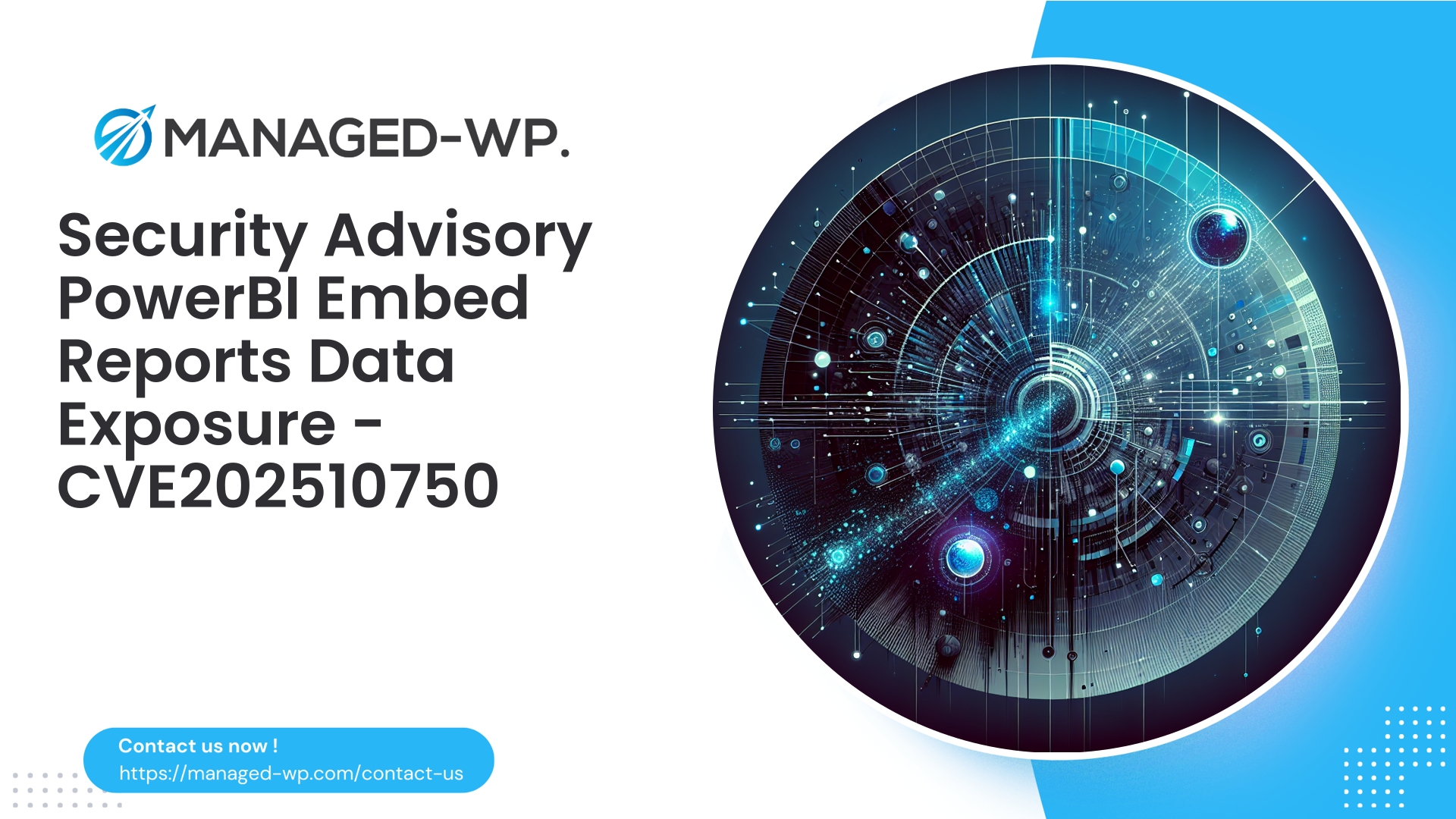| 插件名稱 | 活動門票 |
|---|---|
| 漏洞類型 | 未經認證的支付繞過 |
| CVE編號 | CVE-2025-11517 |
| 緊急 | 高的 |
| CVE 發布日期 | 2025-10-18 |
| 來源網址 | CVE-2025-11517 |
緊急通知:活動門票(≤ 5.26.5)外掛漏洞 – 未經身份驗證的付款繞過 (CVE-2025-11517) – WordPress 網站所有者必須採取的措施
來自 Managed-WP 位於美國的安全專家就影響 Event Tickets 外掛程式的 CVE-2025-11517 漏洞提供的見解和指導,包括威脅概述、偵測策略、緩解措施、監控和回應最佳實踐。
作者: 託管 WordPress 安全團隊
日期: 2025-10-18
概述: 影響 Event Tickets 版本 5.26.5 及更早版本的嚴重驗證繞過漏洞已公開揭露,漏洞編號為 CVE-2025-11517。該漏洞允許未經身份驗證的攻擊者繞過支付驗證,從而在不完成交易的情況下獲取已付費門票。本安全公告概述了該威脅的影響、必要的緊急措施、檢測方法、在無法立即修復漏洞時的臨時保護措施、長期加固技術,以及 Managed-WP 的服務如何立即保護您的網站。
速覽
- 受影響的外掛:Event Tickets(WordPress)– 版本 ≤ 5.26.5
- CVE ID:CVE-2025-11517
- 嚴重程度:高(CVSS ~7.5)
- 漏洞類型:身份驗證繞過/未經身份驗證的支付繞過
- 解決方法:版本 5.26.6 或更高版本 - 立即更新
- 攻擊複雜度:低到中等-無需身份驗證
- 潛在影響:詐欺性購票、經濟損失以及系統進一步受損,取決於設定情況。
為什麼這個漏洞令人擔憂
處理票務銷售的插件是極具吸引力的攻擊目標,因為它們控制交易資料、支付流程和存取權限。此漏洞允許未經授權的用戶將門票標記為已付費或完全繞過支付流程,從而免費參加付費活動。由此造成的損失不僅限於經濟損失;信譽和聲譽也會受到嚴重損害。此外,攻擊者還可以篡改資料以觸發下游流程,例如電子郵件通知或存取憑證,從而進一步增加風險。
由於漏洞不需要身份驗證,因此攻擊途徑非常開放,預計會有大量自動化的利用嘗試。
技術分解
此漏洞屬於身份驗證和支付繞過漏洞。存在漏洞的插件版本允許未經身份驗證的 HTTP 請求修改票務/訂單狀態或呼叫繞過必要網關檢查的付款處理程序。
- 攻擊者無需實際付款即可獲得全額付費的門票。
- 訂單元資料和相關與會者記錄可能被竄改。
- 利用此漏洞無需登入 WordPress。
- 根本原因是處理支付狀態更新的關鍵端點驗證和授權不當。
插件供應商在 5.26.6 版本中解決了這個問題。運行早期版本的網站仍然存在很高的風險。
立即建議採取的行動
-
請檢查您的外掛程式版本
- 造訪 WordPress 管理背景 → 外掛程式 → 已安裝外掛程式 → 活動票券。
- 如果版本為 5.26.5 或更早,請立即執行下列步驟。
-
更新插件
- 請立即將 Event Tickets 升級至 5.26.6 或更高版本。
- 更新後清除緩存,包括物件快取、頁面快取和 CDN 快取。
- 在預發布或測試環境中測試購買流程,以確保其功能正常。
-
如果無法立即更新,則採取臨時措施
- 在條件允許的情況下,將購票頁面置於維護模式。
- 暫時停止或禁用公開售票。
- 啟用防火牆規則或網路應用防火牆(WAF)以封鎖可疑終端機。
- 密切監控日誌,尋找可疑活動。
-
審核票務訂單和與會者數據
- 檢查標記為「已付款」但沒有相應支付網關交易記錄的訂單。
- 調查訂單中任何異常大宗或可疑活動。
-
資格認證輪崗
- 如果懷疑支付網關的管理員密碼遭到入侵,請重設密碼並輪換 API 金鑰。
- 確保主機和控制面板憑證安全。
-
執行全面惡意軟體和完整性掃描
- 掃描插件或核心檔案是否已修改以及是否有入侵跡象。
- 如果偵測到持續攻擊,請立即聯絡專業事件回應團隊。
風險緩解的臨時技術控制措施
在官方補丁發布之前,請採取以下緩解措施來縮小攻擊面。這些措施不能取代官方補丁。
-
暫停公共活動結帳
- 暫時關閉活動報名或要求手動審核。
- 顯示通知頁面,提示暫時停止售票。
-
阻止存在漏洞的 REST 和 AJAX 端點
- 使用您的 Web 應用程式防火牆 (WAF) 或伺服器設定來拒絕針對影響支付的插件 REST 或 AJAX 路由的未經驗證的 POST 請求。
- 如果使用 Managed-WP 的 WAF 服務,請啟動旨在阻止這些未經授權的 API 呼叫的規則。
-
實施速率限制和IP過濾
- 限制與票務相關的端點,以遏制自動化的大規模攻擊嘗試。
- 暫時封鎖或監控來自可疑地點或 IP 位址的流量。
-
強制登入進行購買(如果業務邏輯允許)
- 要求顧客在結帳前建立並驗證帳戶。
-
監控支付網關交易一致性
- 定期將訂單資料與支付網關日誌進行交叉核對,以發現支付差異。
-
新增伺服器端請求驗證標頭
- 設定伺服器或反向代理,以驗證對敏感端點的請求是否攜帶預共用驗證標頭。
警告:強烈建議在生產環境中應用這些臨時控制措施之前,先在測試環境中進行測試,以避免服務中斷。
識別剝削跡象
積極檢視以下指標,以發現可能的濫用行為:
-
訂單異常
- 標記為「已付款」或「已完成」的訂單,但與支付提供者的交易記錄不符。
- 與會者記錄中包含虛假或缺少的買家聯絡資訊。
- 付款金額異常低或為零,卻顯示已付款。
-
Web伺服器日誌
- 向 REST 或 admin-ajax.php 端點發送 POST 請求,並帶有“mark_paid”或“set_status”等參數。
- 來自相同 IP 位址或可疑用戶代理的大量或重複請求。
-
外掛程式和 WordPress 日誌
- 缺少相應網關回呼的支付完成條目。
- 錯誤、警告或驗證失敗數量突然激增。
-
支付網關記錄
- 網關交易日誌與插件訂單狀態不符。
-
主機和安全日誌
- 未經授權的文件變更、意外的管理員登入或建立新的管理員帳戶。
- 可疑的定時或後台進程。
如果發現詐欺訂單的證據,應暫停受影響的活動並立即通知客戶。如有必要,應與支付處理商進行糾紛解決。
事件回應:被利用後的立即措施
-
遏制
- 立即停用購票功能。
- 屏蔽可疑IP位址。
- 考慮隔離該網站,以防止攻擊者進一步訪問。
-
證據保存
- 捕獲伺服器和 WordPress 日誌、資料庫的取證快照。
- 避免覆蓋調查所需的日誌。
-
根除
- 將插件更新至 5.26.6 或更高版本。
- 刪除任何未經授權或可疑的文件。
- 如有可能,撤銷未經授權的訂單更新;保留詳細記錄。
-
恢復
- 必要時恢復備份。
- 輪換所有特權使用者密碼和 API 令牌。
-
通知
- 酌情通知受影響的客戶和監管機構。
-
檢討與強化
- 落實建議的長期安全措施。
- 進行事後檢討並改善監控系統。
長期安全增強
-
保持 WordPress 核心和外掛程式最新
- 頻繁更新可以縮短已知漏洞的暴露窗口期。
-
加強插件更新流程
- 使用測試環境和自動化測試來避免破壞線上網站。
- 請考慮為關鍵安全性更新配置安全的自動更新功能。
-
實作託管式 Web 應用程式防火牆 (WAF)
- 提供虛擬修補功能,並在修補程式發布前阻止漏洞。
-
貫徹最小特權原則
- 限制管理員帳戶數量,並對特權使用者強制執行雙重認證(2FA)。
-
集中式日誌記錄和警報
- 透過可操作的警報監控付款和訂單異常情況。
-
定期進行安全測試
- 安全審計和負責任的資訊揭露計畫能夠最大限度地降低未來的風險。
-
隔離支付工作流程
- 依靠具有加密驗證的網關回呼;減少插件程式碼中的敏感邏輯。
使用 Managed-WP 的防火牆來應對此漏洞的優勢
使用 Managed-WP 託管防火牆的營運商可受益於:
- 立即部署更新後的規則集,在全球範圍內為客戶修復漏洞。
- 阻止未經身份驗證的請求修改訂單/付款狀態。
- 限制攻擊速度並偵測可疑模式,以減緩攻擊速度。
- 發出警報並記錄異常活動,以便及早進行調查。
我們的團隊能夠迅速將漏洞揭露轉化為可操作的防禦特徵,在應用程式插件更新之前為您的網站提供保護。
安全性更新程式
-
備份所有內容
- 對檔案和資料庫進行完整的異地備份。
-
啟用維護模式
- 防止在更新過程中遭受即時攻擊。
-
舞台搭建最新進展
- 驗證關鍵的結帳和支付流程是否如預期運作。
-
更新生產插件
- 立即套用更新、清除快取並測試關鍵工作流程。
-
驗證訂單和付款記錄
- 請確認您的網站與支付網關日誌之間的交易完整性。
- 重新開放門票銷售並進行監控
安全團隊偵測檢查清單
- Event Tickets 外掛程式的版本是否為 5.26.5 或更早版本?
- 是否已更新至 5.26.6+ 版本?
- 是否存在未經授權但已標記為已付款的訂單?
- 是否偵測到 IP 位址向票務端點發出重複的 POST 請求?
- 門票購買或註冊量是否有異常激增?
- 日誌中是否顯示向 REST/AJAX 端點發送了可疑的 POST 請求,且請求中包含支付狀態參數?
- 管理員憑證是否被從非預期位置使用?
- 支付API密鑰在疑似洩漏後是否已輪換?
如果答案為肯定,立即啟動遏制措施和全面事件回應。
概念性的 ModSecurity 風格 WAF 規則建議
以下提供了一個防禦框架,幫助WAF管理員建立規則。請謹慎實施和測試。
- 拒絕向插件命名空間內的 REST API 端點發送未經驗證的 POST 請求。
- 阻止嘗試將訂單狀態設定為「已付款」或「已完成」但沒有有效付款交易 ID 的請求。
- 限制每個 IP 位址在每個時間段內過度建立工單或更新狀態的嘗試次數。
注意:Managed-WP 用戶應要求並啟用針對此漏洞的特定規則集,以確保主動防護。
客戶溝通指南(如記錄受到影響)
- 要保持透明,告知客戶已發現未經授權的出票情況以及正在進行的調查。
- 提供清晰的票務核實或更換流程說明。
- 適當時提供退款或換貨等補救措施。
- 保持暢通的溝通管道,以便及時發布最新資訊和提供支援。
循環支付繞過漏洞的根本原因
票務和電子商務插件的交易流程十分複雜,通常涉及客戶端驗證、Webhook 和網關回呼。導致故障的常見問題包括:
- 修改財務狀態的端點缺乏強大的伺服器端授權機制。
- 過度信任客戶提供的數據,而沒有透過支付網關進行交叉驗證。
- 依賴前端 nonce 或 JavaScript 檢查,攻擊者可以透過直接 HTTP 請求繞過這些檢查。
對於支付流程安全而言,強大的伺服器端驗證和對外部輸入的最低限度信任是不可妥協的。
Managed-WP 如何支援您的安全態勢
作為值得信賴的 WordPress 安全合作夥伴,Managed-WP 提供:
- 持續更新、管理的 WAF 規則集,包括針對關鍵漏洞的虛擬修補程式。
- 漏洞揭露後立即快速部署保護性簽章。
- 增強惡意軟體掃描和事件修復支援。
- 提供分級服務,可根據需求進行客製化,從基本防護到全面事件管理。
我們鼓勵現有的 Managed-WP 客戶啟用防火牆規則的自動更新,以實現無縫保護。
立即開始使用 Managed-WP 免費保護
保護您的 WordPress 網站免受已知威脅
為了在規劃後續更新和調查的同時獲得即時的基礎安全保障,請註冊 Managed-WP 的免費基礎套餐。該套餐包含託管防火牆保護、惡意軟體掃描以及針對 OWASP Top 10 風險的防禦——為抵禦此類漏洞奠定堅實的基礎。立即開始您的免費保護: https://my.wp-firewall.com/buy/wp-firewall-free-plan/
如需高級修復、虛擬修補和專家支持,請考慮我們的標準版或專業版套餐。
常問問題
問: 光是升級到 5.26.6 版本就足以保障我的網站安全嗎?
一個: 更新固然重要,但如果發生攻擊,則需要採取額外的事件回應步驟來補救未經授權的更改,並確保不會留下任何持久性影響。
問: 我可以完全依賴妻子的隱私保護嗎?
一個: WAF 對於即時防禦至關重要,可以快速阻止漏洞利用,但必須配合及時修補才能實現全面安全。
問: 我應該給受影響的客戶退款嗎?
一個: 這取決於您的業務政策和詐欺程度。與客戶保持透明和清晰的溝通至關重要。
Managed-WP 安全專家的最終建議
該漏洞凸顯了幾個重要教訓:
- 任何管理支付的插件都必須強制執行嚴格的伺服器端驗證—永遠不要只信任客戶端檢查。
- 快速採取行動,將託管防火牆保護與立即修補相結合,對於最大限度地減少損失至關重要。
如果您管理具有票務或電子商務功能的 WordPress 網站,請將此建議作為高優先事項處理:將 Event Tickets 更新至 5.26.6 或更高版本,審核最近的交易,如果無法立即修補,請套用建議的緩解措施。
如需在風險評估、套用虛擬修補程式或事件調查方面獲得專家協助,Managed-WP 團隊隨時準備為您提供協助。註冊我們的免費計劃,即可立即獲得基礎防護: https://my.wp-firewall.com/buy/wp-firewall-free-plan/
附錄:實用資源
- CVE-2025-11517 公開紀錄 – 查看官方漏洞詳情。
- 活動門票外掛發行說明 – 請查閱供應商的更新和安全公告。
- 支付網關對帳指南 – 核對您的交易與網關資料是否一致。
作者: 託管 WordPress 安全團隊
如需活動審查或協助,請聯絡您的 Managed-WP 入口網站或託管服務提供者的事件支援團隊。



















